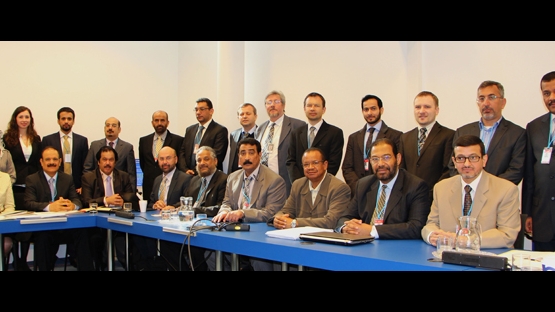One of the statutory functions of the IAEA is to establish standards of safety in the application of nuclear energy for peaceful purposes, in order to ensure the protection of health, life and property. In order to meet these standards, it is important that Member States have in place a comprehensive infrastructure for the safe use of nuclear technology. As part of this, Member States need to develop emergency preparedness and response plans that will allow them to respond effectively to a nuclear or radiological emergency.
With the growth in activities related to the development of nuclear power in the Gulf region, the Gulf Cooperation Council (GCC) has been working to ensure that in the case of a nuclear or radiological disaster, Member States are able to provide an effective emergency response in a coordinated manner. In this regard, the GCC is developing a Regional Radiological and Nuclear Emergency Preparedness and Response (RRNEPR) Plan, which will be executed under the responsibility of the GCC Emergency Management Center located in Kuwait, the organization responsible for the preparedness and response to radiological and nuclear events in the region. This would be the first of its kind in that the RRNEPR Plan aims to coordinate and harmonize the response of the participating Member States to any nuclear or radiological emergency in the region.
Through the IAEA technical cooperation (TC) project RAS/2/015, Supporting the Introduction of Nuclear Power for Electricity Generation and Seawater Desalination, the IAEA has been supporting the GCC countries in their development of the RRNEPR Plan. The IAEA had hosted a workshop in August 2013 with the objective of reviewing the first draft of the RRNEPR Plan to check for its compliance and consistency with applicable requirements of the IAEA Safety Standard Series No. GS-R-2, Preparedness and Response for a Nuclear and Radiological Emergency. Based on the recommendations made at that workshop, the GCC revised the plan and a meeting to review the final draft RRNEPR Plan was held at IAEA Headquarters, Vienna during March 31 to April 2, 2014 under the TC project. Over 35 participants from the six GCC countries together with experts and technical staff from the IAEA's Incident and Emergency Centre (IEC) reviewed and discussed the final RRNEPR Plan in detail to ensure that it was comprehensive and consistent with the best practices identified by the IAEA. It was noted that the final draft also took into consideration the lessons learned from the Fukushima-Daiichi nuclear accident with regard to nuclear emergency preparedness and response. It was also recognized that substantial work has been carried out for the first time on nuclear and radiological emergency planning at the regional level and that this could serve as a model for subsequent similar emergency planning in other regions. This would constitute as an example of an international best practice for effective regional cooperation catalysed by a common need and concern and brought by complementarity of capabilities amongst countries.
When asked why it's important to coordinate emergency response policies, Dr Adnan Al-Tamimi, Chairman of the GCC Emergency Management Centre, explained, "In the Gulf, we have many small countries next door to one another, and so radiological and nuclear events are inherently regional." He emphasised that the participants had extensively "evaluated the RRNEPR Plan to ensure that our strategies meet the relevant standards of the GS-R-2."
The workshop also explored the needs of the Gulf countries with regards to human resource development, particularly the training and expertise necessary for the implementation of the emergency response plan and the follow-up actions necessary to implement the plan. Dr Nader Al-Awadhi, National Liaison Officer for the IAEA in Kuwait, explained that "special attention will be given to regional training and exercises, which are essential parts of the RRNEPR plan."
Last week's meeting marks one of the final stages in the completion of the Regional Radiological and Nuclear Emergency Preparedness and Response Plan amongst the GCC countries.
Dr. Nader Al-Awadhi, Executive Commissioner for International Cooperation at the Kuwait Institute for Scientific Research and National Liaison Officer for the IAEA in Kuwait, speaks about the Gulf Cooperation Council and the workshop (Arabic interview). Listen here>>


